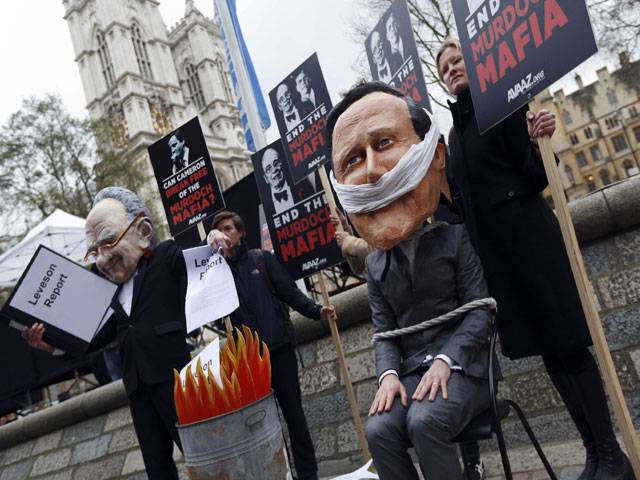LONDON - A major inquiry called Thursday for new laws to underpin a tougher watchdog for Britain’s “outrageous” newspapers in a move that threatens to split Prime Minister David Cameron’s coalition government.
Senior judge Brian Leveson, who led the eight-month inquiry following the phone-hacking scandal that closed down Rupert Murdoch’s News of the World, also criticised politicians for getting too close to the press.
His eagerly awaited report called for an independent self-regulatory body backed by legislation, saying that decades of misbehaviour by the British press had undermined its own argument that it works in the public interest. Lord Justice Leveson said in a statement that the British newspaper industry had “wreaked havoc with the lives of innocent people” and “acted as if its own code, which it wrote, simply did not exist.”
He said behaviour of the press “at times, can only be described as outrageous.”
Victims of phone hacking and press harassment broadly welcomed his findings.
Cameron personally set up the Leveson Inquiry and will come under pressure to implement its recommendations, despite previously appearing cool on new legislation.
He was due to make a statement to parliament on the report’s conclusions at 1500 GMT.
But the report divided the coalition government before it was even unveiled, with Liberal Democrat Deputy Prime Minister Nick Clegg taking the unusual step of demanding to make a separate statement after Cameron.
The British press, already suffering huge losses of readers and advertisers, currently regulates itself through the Press Complaints Commission, a body staffed by editors. Its critics say it is toothless.
Leveson said in his report that a new watchdog would have independent members, except for one editor. It would have the power to fine up to £1 million ($1.6 million, 1.23 million euros) and to order the publication of apologies and corrections.
Those powers would be backed by new laws, he said, summing up his plans as “independent regulation of the press organised by the press, with a statutory verification process”.
The judge suggested that the British broadcasting regulator, Ofcom, could be used as a “backstop” for newspapers that refused to join in the scheme.
Leveson added that it was now up to lawmakers to decide what to do with his recommendations, saying: “The ball moves back into the politicians’ court. They must now decide who guards the guardians.”
Hacked Off, a victims’ campaign group featuring Hollywood star Hugh Grant, said the inquiry’s proposals were “reasonable and proportionate”.
Former Formula One supremo Max Mosley, who successfully sued the News Of The World for privacy damages, welcomed Leveson’s proposals and said it would be “astonishing” if politicians failed to follow them.
The prime minister set up the Leveson Inquiry in July 2011 in the wake of revelations that the News of the World had hacked the voicemails of murdered schoolgirl Milly Dowler as well as dozens of public figures.
Murdoch was forced to shut down the 168-year-old newspaper over the scandal.
Over eight months of hearings, the Leveson Inquiry heard from victims of press intrusion including actors and celebrities, as well as politicians, journalists, police and newspaper executives.
Meanwhile, ex-News of the World editor Andy Coulson and the former head of Rupert Murdoch’s British press empire Rebekah Brooks appeared in court Thursday to face charges of bribing public officials.
Brooks, the 44-year-old former chief executive of News International, is alleged to have paid a Ministry of Defence official for information for The Sun newspaper, which like the now-defunct News of the World is owned by Murdoch. Coulson, who became the head of communications for British Prime Minister David Cameron after editing the News of the World, is accused of paying for information including a directory of telephone numbers for the royal family.
By coincidence, they were in court on the day that the results were to be published from an extensive British judge-led inquiry into press ethics, which was set up as a result of the phone-hacking scandal at the News of the World.
Thursday, April 18, 2024
British inquiry urges new laws for ‘outrageous’ press

Courage vs Hypocrisy
April 18, 2024
Modi’s Pulwama-Like Operations
April 18, 2024
Justice denied
April 18, 2024
AI dilemmas unveiled
April 18, 2024
Tax tangle
April 18, 2024
Rail Revival
April 17, 2024
Addressing Climate Change
April 17, 2024
Saudi Investment
April 17, 2024
Political Reconciliation
April 16, 2024
Pricing Pressures
April 16, 2024
Workforce inequality
April 17, 2024
New partnerships
April 17, 2024
Shikarpur crisis
April 17, 2024
Peace quest
April 17, 2024
Democratic harmony
April 16, 2024
ePaper - Nawaiwaqt
Advertisement
Nawaiwaqt Group | Copyright © 2024





